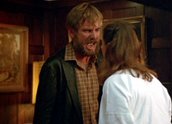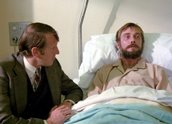


My First Wife (1984)
Synopsis
John’s happy life as a composer and family man collapses when his wife Helen says she’s leaving him. She’s having an affair with one of his friends, but that’s just a symptom of the long-ignored problems in their marriage. John (John Hargreaves) becomes morose, unpredictable, and potentially violent after Helen (Wendy Hughes) moves out with their daughter Lucy (Lucy Angwin). As his own father (Robin Lovejoy) lies dying in hospital, John takes pills and wakes up in a psychiatric unit. Helen moves back in briefly, but the marriage is over. John gains some perspective only after the death of his father.
Curator’s notes
This is one of Paul Cox’s most personal films in a career that is not short of personal statements. He made it after he had gone through a painful break-up, but he has said that the only autobiographical character is John the composer. Despite the title, the film is almost entirely about John, rather than Helen, but it’s relentlessly self-critical, rather than indulgent. John has no idea of why his marriage has failed, nor how self-centred he really is. He reserves his emotions for his work, retreating into music, his refuge for all that’s troubling his world. Cox creates a sense of his psychic reality through a series of montages, using grainy footage and opera. Many of these montages centre on trains and other forms of transport – an obvious metaphor for escape, but also for the sense of order that’s lacking in John’s life. He prefers to take the train, so he can think, he says at one point, but it’s probably the opposite. It helps him get away from his thoughts.
The film was made after Lonely Hearts (1981), which also starred Wendy Hughes, and before Cactus (1986). David Stratton has called these a ‘trilogy of love films’, 'They are among the most beautiful and painful of Australian movies’. John Hargreaves, in one of his infrequent roles as a leading man, won the 1984 AFI award for best performance. Cox won best director and shared the best original screenplay award with Bob Ellis – perhaps ironic, because Paul Cox later maintained that Ellis had little to do with the final script.
- Overview
- Curator’s notes
- Video 3 clips
- Principal credits
- Find a copy
- Make a comment
- Add your review



